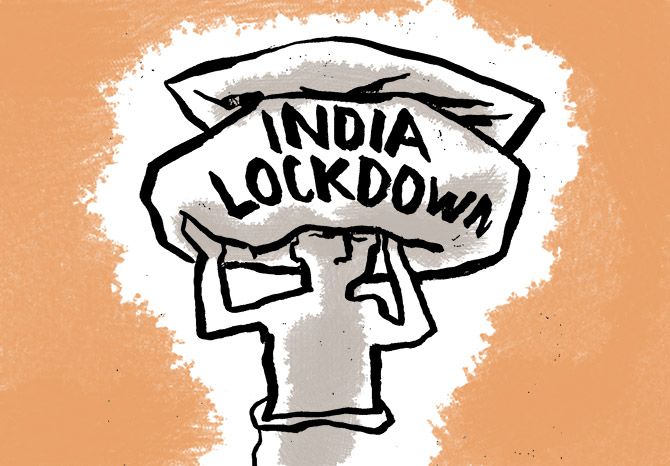‘The numbers are null and void now. Look, we can give out projections now, but we know that a week later those numbers will also be irrelevant. So we need to wait,’ a top government official said.
Illustration: Dominic Xavier/Rediff.com.

The government will give out new official economic growth and budgetary projections in July or later, only after the worst of the Covid-19 pandemic is behind the country, and there is a greater clarity on its economic impact.
This has come after the finance ministry admitted that the projections in the 2020-21 Union Budget and 2019-20 Economic Survey are rendered meaningless due to the Covid-induced slowdown.
Senior officials say the ministry does have internal estimates for FY21 gross domestic product (GDP) growth, but these are subject to frequent revisions. Only when there is some finality on the projections will they be announced publicly.
A call will also be taken on how to present new projections, which will need to be tabled in Parliament.
“We have some projections for our own use, but these are being revised regularly. The situation is quite dynamic and unknown. There is no clarity on how long before there is a sustained fall in number of new daily cases, to what extent will the economy open up after May 3, how long will it take for people to go back to work, and how long will it take for the economic activity to resume fully,” said a top government official.
Within the finance ministry, income tax officers have urged for revision of the Budget estimates as earnings of majority of the corporate sector have been hit due to the Covid-19 lockdown, and the Budget revenue collection targets no longer hold.
“Fiscal year 2020-21 is another outlier year, like 2016-17 was because of demonetisation. Demonetisation saw higher than usual mop-up, while this year will see lower than usual collection. Hence, the entire annual financial statement in the Budget will need a revision, where revenue projections will need serious scaling down,” said a second official. The person said the revised financial statement will likely be prepared some time in July.
The 2019-20 Economic Survey pegged 2020-21 real GDP growth at 6-6.5 per cent. In her 2020-21 Union Budget, Finance Minister Nirmala Sitharaman had budgeted the size of the Centre’s total expenditure at Rs 30.4 trillion. Gross tax revenue was budgeted at Rs 24.23 trillion, while divestment target has been pegged at Rs 2.12 trillion. The fiscal deficit target is at 3.5 per cent of GDP.
“These numbers are null and void now. Look, we can give out projections now, but we know that a week later those numbers will also be irrelevant. So we need to wait,” the first official said.
The CBDT has given state-wise targets to field officers based on budget estimates presented in February, which officers feel is pointless. “This is a mechanical exercise. What is the point of these targets now? The revised targets should be made available to plan the year,” the second official quoted above said.
For 2019-20, the direct tax collections missed the downward revised target by Rs 1.42 trillion and came in at Rs 10.27 trillion, an 8 per cent fall over the previous year. This makes the FY21 target meaningless, according to income tax officials. A growth of 28.2 per cent will be needed, as against the assumed rate of 12 per cent in the budget to meet the collection target of Rs 13.19 trillion.
The International Monetary Fund (IMF) has cut India’s growth forecast for FY21 in its World Economic Outlook (WEO) report to 1.9 per cent from 5.8 per cent, projected in January. It pointed out that the Covid-19 will throw the world economy into the worst recession.
Barclay’s slashed India’s growth projection for calendar year 2020 to zero, arguing that the economic impact will be worse than expected.










